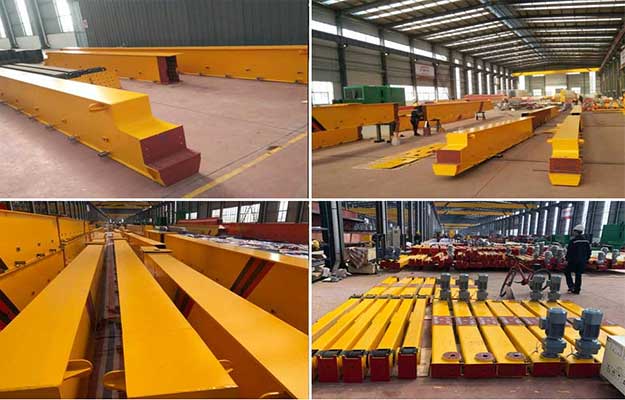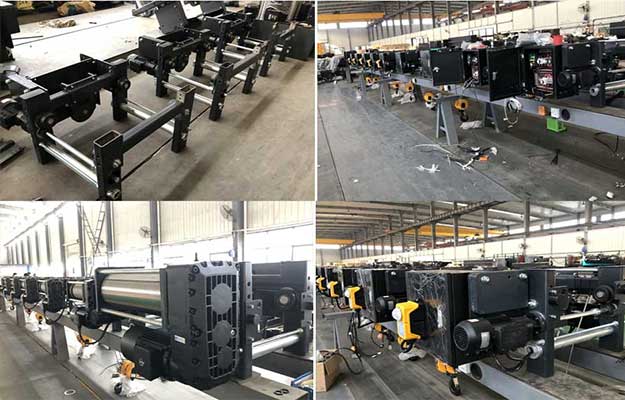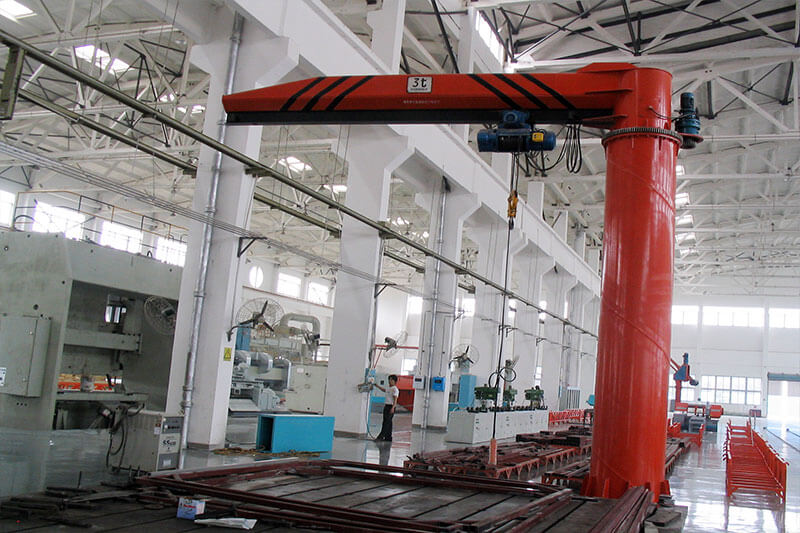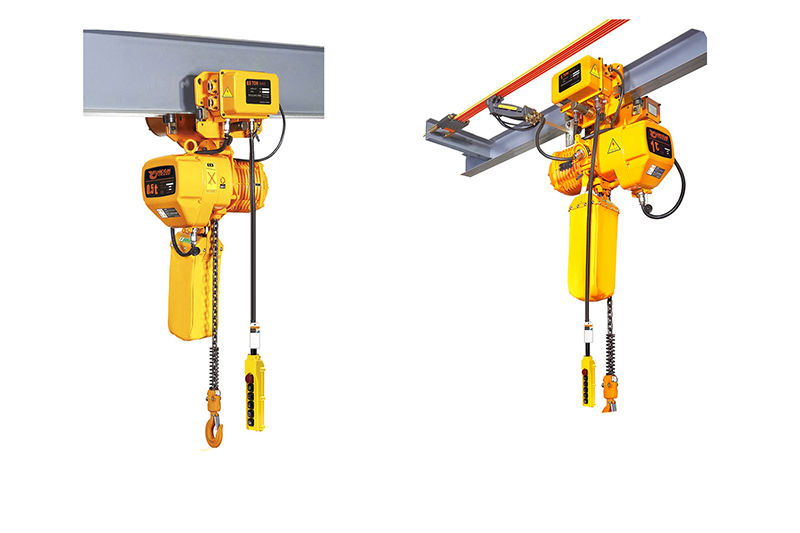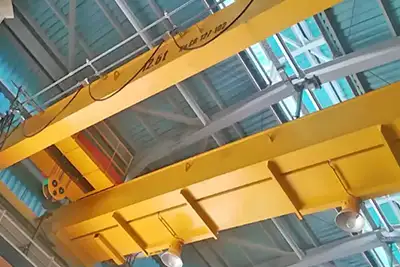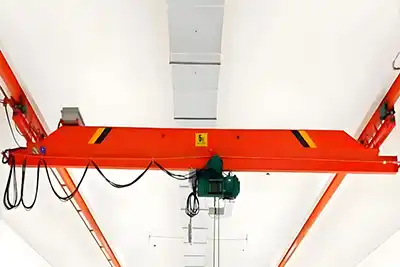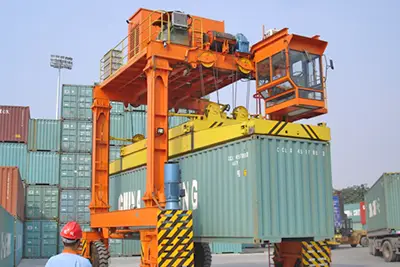Overhead Cranes for Trailer Manufacturing, 5 Ton 10 Ton Case
5 ton & 10 ton overhead cranes for trailer manufacturing in Mexico. Check overhead crane project & all you want to know about overhead crane for trailer factory.
Comprehensive Guide to Overhead Cranes for Trailer Manufacturing Plants
Introduction: Unleash Efficiency with Overhead Cranes
In the bustling world of trailer manufacturing, where precision, efficiency, and safety are paramount, overhead cranes stand as silent sentinels, orchestrating the symphony of production. These mechanical marvels play an indispensable role in streamlining operations, lifting heavy burdens, and elevating productivity to new heights. In this comprehensive guide, we'll explore the world of overhead cranes, their diverse types, features, and applications, and why they have become the trusted workhorses of the trailer manufacturing industry.
The Role of Overhead Cranes in Trailer Manufacturing
Imagine a bustling trailer manufacturing plant, where raw materials are transformed into robust cargo carriers. In this dynamic environment, materials, components, and trailers themselves need to be precisely positioned, lifted, and transported with efficiency and care. This is where overhead cranes come into play.
Overhead cranes, often referred to as bridge cranes or EOT (Electric Overhead Traveling) cranes, are designed to perform heavy lifting and material handling tasks with remarkable precision. Suspended from the ceiling or supported on runways, these cranes boast the ability to move heavy loads horizontally and vertically, covering vast areas within the manufacturing facility.
In the world of trailer manufacturing, overhead cranes are akin to the skilled artisans of yesteryears, meticulously placing each piece of the puzzle in its rightful place. They are the muscle behind the finesse, the backbone supporting the creation of trailers that are sturdy, reliable, and built to withstand the rigors of the road.
Single girder overhead crane for trailer manufacturing factory and facility
Why Choose Overhead Cranes?
Now, you might wonder, with a myriad of material handling options available, why opt for overhead cranes? The answer lies in the unique blend of capabilities and benefits they offer:
- 1. Precision Lifting and Positioning: Overhead cranes are masters of precision, capable of lifting heavy components and trailers with unmatched accuracy. This precision is crucial in trailer manufacturing, where even a fraction of an inch can make a significant difference in the final product's quality.
- 2. Space Optimization: These cranes operate above the workspace, leaving the floor unobstructed. This design not only optimizes space but also allows seamless movement of materials and trailers, reducing the risk of collisions and congestion.
- 3. Increased Efficiency: Overhead cranes are adept at streamlining production processes. They enable rapid and efficient material flow, reducing the time required to assemble trailers. This efficiency translates into higher production output and shorter lead times.
- 4. Enhanced Safety: Safety is paramount in any manufacturing environment. Overhead cranes are equipped with an array of safety features, including limit switches, overload protection, and emergency stop buttons. These features minimize the risk of accidents and injuries.
- 5. Customization for Specific Needs: Trailer manufacturing is a diverse industry with varying requirements. Overhead cranes can be customized to suit specific needs, whether it's lifting heavy steel frames, positioning delicate components, or navigating tight spaces.
- 6. Cost Savings: By streamlining operations, reducing labor requirements, and minimizing material handling errors, overhead cranes contribute to significant cost savings over the long term.
As we delve deeper into the world of overhead cranes, we'll explore the various types, features, and applications that make them indispensable tools in the arsenal of trailer manufacturing facilities. So, let's embark on this journey to uncover the secrets of these mechanical marvels that drive efficiency, safety, and success in the world of trailer manufacturing.
Types of Overhead Cranes
The world of overhead cranes is as diverse as the industries they serve. Each type of crane is engineered to excel in specific applications, offering unique advantages. Let's explore the various types of overhead cranes commonly used in trailer manufacturing facilities.
- 1. Bridge Cranes (Single Girder and Double Girder): Bridge cranes are versatile workhorses, with single girder variants being cost-effective solutions for moderate loads, while double girder models are designed for heavier lifting tasks.
- 2. Gantry Cranes: Gantry cranes, supported on legs that run on the floor, are ideal for both indoor and outdoor material handling, including loading and unloading trailers.
- 3. Jib Cranes: Jib cranes have a vertical post or mast with a horizontal boom, making them perfect for precise workstation lifting and maintenance tasks.
- 4. Monorail Cranes: Monorail cranes consist of a single rail system with a hoist and trolley, designed for linear material handling in production lines.
- 5. Wall-Mounted Cranes: Wall-mounted cranes are space-efficient solutions attached to walls or vertical structures, suitable for workstation support and localized lifting.
- 6. Underhung Cranes: Underhung cranes are compact, ceiling-mounted options that excel in confined spaces and environments with limited ceiling height.
- 7. Wire Rope Hoist Cranes: Wire rope hoist cranes use a drum and wire rope for controlled and precise lifting, ideal for heavy component positioning.
- 8. Chain Hoist Cranes: Chain hoist cranes use a chain and hoist mechanism for controlled lifting in tight spaces, offering flexibility and economy.
Selecting the Right Crane Type for Your Needs:
Choosing the right overhead crane type for your trailer manufacturing needs involves considering factors like load capacity, workspace layout, ceiling height, and the specific tasks the crane will perform. The selection process is a critical step in ensuring optimal performance and efficiency within your facility.
In the following sections, we'll explore the features and benefits of each overhead crane type, shedding light on their unique applications and advantages. Whether you're lifting heavy trailer frames, positioning delicate components, or optimizing space utilization, there's an overhead crane type designed to meet your precise requirements.
Transforming Mexico's Trailer Manufacturing Industry with Custom Overhead Cranes: A Yuantai Crane Success Story"
In the rapidly advancing landscape of Mexico's trailer manufacturing industry, the demand for precision and efficiency has never been greater. To meet this challenge, Yuantai Crane, one of China's top crane manufacturers, delivered a game-changing solution to a prominent trailer plant in Mexico. This case study unveils how Yuantai Crane's expertise, innovation, and tailored crane solutions have elevated the production capabilities of the Mexican trailer manufacturer.
Background and Challenges
As Mexico's trailer industry expanded, the need to enhance production capacity became evident. To address this, the trailer manufacturing plant embarked on an ambitious project to establish four new warehouses. However, the key to unlocking their full potential lay in selecting the right overhead crane solutions.
Yuantai Crane's Approach
To satisfy the client's unique requirements, Yuantai Crane custom-designed 20 European single girder overhead cranes, each meticulously crafted to align with the plant's workshops and specific application needs.
Main Parameters of 20 Sets of Overhead Cranes
European single girder overhead crane—5 sets
- Lifting capacity: 5 tons
- Span: 17 meters
- Lifting height: 6.3 meters
- Power supply: 415V 50HZ 3P
European single girder overhead crane—10 sets
- Lifting capacity: 5+5 tons
- Span: 17 meters
- Lifting height: 6.3 meters
- Power supply: 415V 50HZ 3P
European single girder overhead crane—5 sets
- Lifting capacity: 10 tons
- Span: 17 meters
- Lifting height: 6.3 meters
- Power supply: 415V 50HZ 3P
Production and Quality Assurance
Yuantai Crane maintained transparency throughout the production process by regularly sharing photos with the client, assuring the quality of the European single girder overhead cranes at every stage.
Package, Delivery, and Installation
Ingeniously overcoming logistical challenges, Yuantai Crane divided the crane span into two parts for safe delivery by 40-foot top containers. Upon arrival, the client successfully assembled the cranes with support from Yuantai Crane's installation manual and electrical drawings.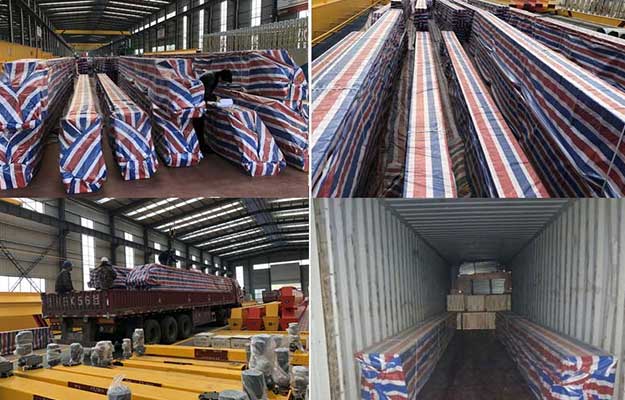
Client Satisfaction and Warranty
Impressed by the crane's quality and Yuantai Crane's exceptional service, the Mexican client completed the installations with ease. Yuantai Crane stands by its promise of a warranty, ready to provide free replacements for any quality-related parts.
This case study underscores Yuantai Crane's commitment to delivering tailor-made solutions that empower clients to enhance their production capabilities, even in the most challenging environments. With precision, innovation, and dedication, Yuantai Crane is elevating industries worldwide, one crane at a time.
Features and Benefits of Overhead Cranes Used in Trailer Manufacturing Workshop
In the high-stakes world of trailer manufacturing, where precision and efficiency are non-negotiable, overhead cranes emerge as the unsung heroes, seamlessly orchestrating the movement of heavy materials and trailers. These mechanical workhorses come equipped with a range of features and offer a plethora of benefits that elevate the production process to new heights. Let's delve into the common features that make overhead cranes indispensable and the benefits they bring to the trailer manufacturing workshop.
Common Features of Overhead Cranes
- 1. Main Girders and End Carriages:
- Strength and Durability The main girders, typically constructed from high-strength I-beams, provide the structural backbone of the crane. They ensure the crane's ability to withstand heavy loads and maintain stability during operations.
- End Carriages These components house the wheels that allow the crane to move along the runways. End carriages are essential for the crane's lateral movement, ensuring smooth and precise transport of materials.
- 2. Hoist and Trolley Systems:
- Lifting and Positioning The hoist, mounted on a trolley, serves as the crane's workhorse, responsible for lifting, lowering, and positioning heavy loads with exceptional precision. The trolley's movement along the main girder facilitates accurate placement of materials and components.
- 3. Control Options:
- Versatile Control Overhead cranes offer various control options, including pendant controls, wireless remote controls, and cabin controls. These versatile control mechanisms empower operators to manage the crane's movements with ease and precision, adapting to the specific needs of the task.
- 4. Safety Devices:
- Protection Mechanisms Safety is paramount in overhead crane operations. These cranes come equipped with an array of safety devices, including limit switches to prevent over-travel, overload protection to safeguard against excessive loads, and emergency stop buttons. These features minimize risks and enhance the overall safety of the workshop.
- 5. Compliance with Standards:
- Quality Assurance Overhead crane manufacturers design and build these machines to meet strict industry standards and regulations, such as FEM (European Federation of Materials Handling) and DIN (Deutsches Institut für Normung) standards. This commitment to compliance ensures the crane's safety, reliability, and performance.
Benefits of Using Overhead Cranes
- 1. Precision Lifting and Positioning: Meticulous Accuracy Overhead cranes are masters of precision, capable of lifting and positioning heavy loads with pinpoint accuracy. In the realm of trailer manufacturing, where millimeters matter, this level of precision ensures that components fit seamlessly, contributing to the overall quality of the trailers produced.
- 2. Space Optimization: Efficient Use of Workspace Overhead cranes operate above the workspace, leaving the floor unobstructed. This design not only optimizes space but also enables the seamless movement of materials and trailers, reducing the risk of collisions and congestion. Space efficiency is crucial in crowded manufacturing facilities.
- 3. Increased Efficiency: Streamlined Processes Overhead cranes are adept at streamlining production processes. They enable rapid and efficient material flow, reducing the time required to assemble trailers. This efficiency translates into higher production output and shorter lead times, essential for meeting customer demands.
- 4. Enhanced Safety: Risk Reduction Safety is not a mere feature but a fundamental aspect of overhead crane design. The incorporation of safety devices, coupled with rigorous adherence to standards, minimizes the risk of accidents and injuries in the workshop. This safeguarding of personnel and equipment is invaluable.
- 5. Customization for Specific Needs: Tailored Solutions Trailer manufacturing is a diverse industry with varying requirements. Overhead cranes can be customized to suit specific needs, whether it's lifting heavy steel frames, positioning delicate components, or navigating tight spaces. This adaptability ensures that the crane aligns perfectly with the workshop's demands.
- 6. Cost Savings: Efficiency Equals Savings By streamlining operations, reducing labor requirements, and minimizing material handling errors, overhead cranes contribute to significant cost savings over the long term. These savings bolster the workshop's profitability and competitiveness.
In the competitive landscape of trailer manufacturing, where every detail counts, overhead cranes emerge as indispensable tools that not only meet the challenges of the industry but also elevate the standards of precision, efficiency, and safety. They are the silent partners in the journey of crafting trailers that are not just products but testaments to quality and reliability.
Typical Applications of Overhead Cranes
Overhead cranes, with their diverse types and capabilities, find themselves at the heart of various applications within trailer manufacturing facilities. Each crane type offers unique advantages, making them indispensable tools for specific tasks. Let's explore the typical applications of overhead cranes in the world of trailer manufacturing.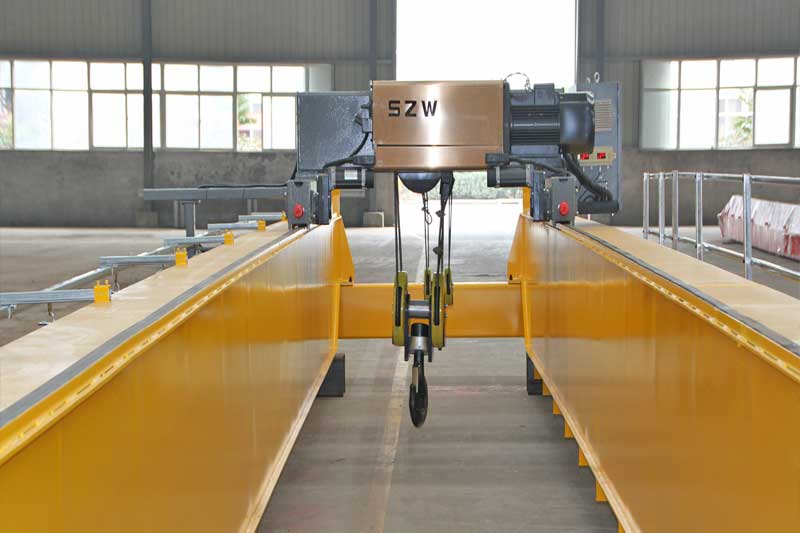
Bridge Cranes (Single Girder and Double Girder)
- Ideal for Heavy Load Handling: Bridge cranes, both single girder and double girder variants, excel in handling heavy loads commonly encountered in trailer manufacturing. They are the go-to choice for lifting substantial components, steel frames, and other robust materials.
- Versatile for Various Production Stages: Bridge cranes adapt seamlessly to different production stages, from material storage and component assembly to final trailer assembly. Their versatility ensures that they play a crucial role throughout the manufacturing process.
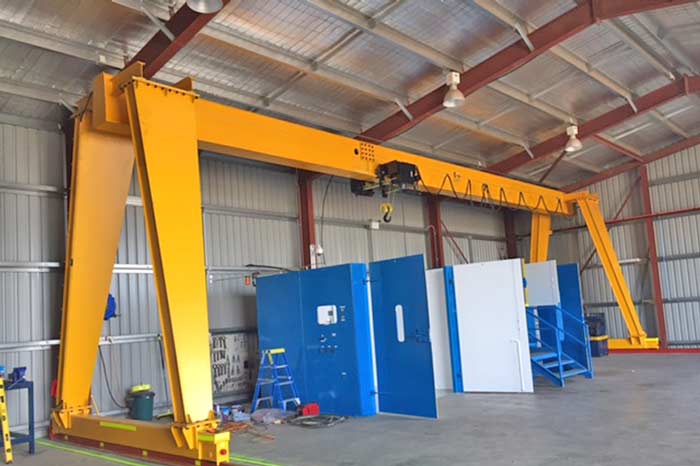
- Outdoor and Indoor Material Handling: Gantry cranes, supported on legs that run on the floor, prove their mettle in both outdoor and indoor environments. They are equally effective at handling materials under open skies or within the confines of a manufacturing facility.
- Loading and Unloading Trailers: One of the key applications of gantry cranes in trailer manufacturing is the efficient loading and unloading of trailers. Their mobility and lifting capacity make them ideal for this crucial task.
- Precision Workstation Lifting: Jib cranes are the masters of precision when it comes to workstation lifting. They are commonly employed for tasks that require careful positioning of components and materials during the trailer assembly process.
- Maintenance and Repairs: Jib cranes also find application in maintenance and repair work within the workshop. They provide a stable platform for technicians to work on trailers and equipment with ease.
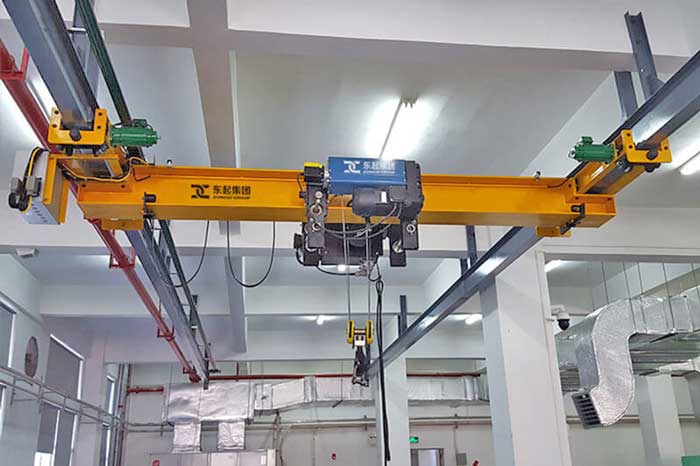
- Compact Ceiling-Mounted Solution: Underhung cranes are compact and ceiling-mounted, making them suitable for facilities with limited headroom. They are essential for maneuvering in constrained spaces while maintaining efficient material handling.
- Limited Ceiling Height Applications: In areas where ceiling height is a limiting factor, underhung cranes offer an effective solution. They provide the necessary lifting capacity without compromising on space.
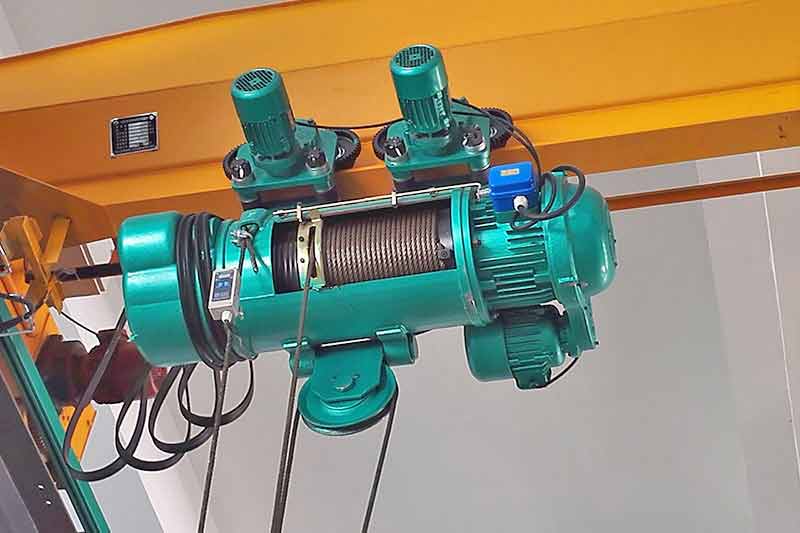
- Heavy Component Positioning: Wire rope hoist cranes are the workhorses for heavy component positioning in trailer manufacturing. Their robust lifting capabilities make them indispensable for handling substantial trailer parts.
- Reliable and Robust Lifting: These cranes are known for their reliability and robustness, ensuring that heavy components are lifted and placed with the utmost precision and safety.
- Controlled Lifting in Tight Spaces: Chain hoist cranes are adept at controlled lifting in tight and confined spaces within the workshop. Their compact design and flexible operation make them ideal for navigating constrained areas.
- Flexible and Economical Solutions: Chain hoist cranes offer an economical solution for various lifting needs in trailer manufacturing. They provide flexibility in adapting to different tasks without breaking the budget.
In the dynamic world of trailer manufacturing, overhead cranes stand as versatile allies, each type designed to excel in specific applications. Whether it's lifting hefty trailer components, ensuring precision during assembly, or optimizing material flow, overhead cranes play a pivotal role in shaping the industry's efficiency and quality standards.
Industrial Applications of Overhead Cranes in Trailer Manufacturing Facilities
In the dynamic landscape of trailer manufacturing, the role of overhead cranes transcends mere lifting and positioning. These versatile mechanical marvels find themselves at the heart of various industrial applications, each contributing to the efficiency, precision, and quality that define the industry. Let's delve into the industrial applications of overhead cranes within trailer manufacturing facilities.
Welding and Fabrication
- Handling Heavy Steel Components: The welding and fabrication stage in trailer manufacturing demands the precise handling of heavy steel components. Overhead cranes, with their robust lifting capabilities, ensure that steel frames, chassis, and other sizeable components are positioned accurately for welding operations.
- Precise Positioning for Welding: Welding requires meticulous precision to achieve strong and durable joints. Overhead cranes facilitate the exact placement of components, ensuring that welds are executed flawlessly and contributing to the structural integrity of the trailers.
Assembly
- Efficient Component Assembly: Trailer assembly is a complex process involving numerous components, from axles and suspensions to cargo bays and electrical systems. Overhead cranes streamline the assembly process by lifting and positioning these components with speed and precision.
- Streamlined Production Lines: Overhead cranes play a pivotal role in maintaining the flow of materials along production lines. They enable efficient component delivery to assembly stations, reducing downtime and optimizing the production process.
Painting and Finishing
- Transporting Trailers for Coating: Before trailers hit the road, they undergo painting and finishing processes to protect them from the elements and enhance their aesthetic appeal. Overhead cranes are instrumental in transporting trailers to painting booths, ensuring that each trailer receives its protective coat.
- Ensuring High-Quality Finishes: Precision in material handling is critical during the painting and finishing stage. Overhead cranes contribute to high-quality finishes by allowing trailers to be positioned for even and thorough coating, resulting in trailers that not only look great but also stand the test of time.
Quality Control and Inspection
- Inspecting Completed Trailers: Quality control is non-negotiable in trailer manufacturing. Overhead cranes assist in moving completed trailers to inspection stations, where meticulous checks ensure that each trailer meets the highest standards of safety and performance.
- Ensuring Compliance with Standards: Trailers must adhere to industry and safety standards. Overhead cranes play a crucial role in facilitating inspections, allowing inspectors to access all areas of the trailer for compliance checks, ensuring that trailers are roadworthy and reliable.
Loading and Shipping
- Loading Trailers onto Transport Vehicles: Before trailers embark on their journeys, they must be loaded onto transport vehicles efficiently and safely. Overhead cranes are the trusted allies in this process, lifting and positioning trailers onto trucks or trailers for delivery to customers.
- Expedited Shipping Processes: In an industry where timing is everything, overhead cranes expedite the loading and shipping processes. They minimize loading times, ensuring that trailers are dispatched promptly to meet customer deadlines and market demands.
In the world of trailer manufacturing, where precision, efficiency, and quality are paramount, overhead cranes stand as the linchpin of operations. They not only lift heavy burdens but also elevate the industry's standards, contributing to the creation of trailers that are not just products but symbols of durability, reliability, and excellence.
Top Concerns of Overhead Crane Users in Trailer Manufacturing Facilities
While overhead cranes are indispensable assets in trailer manufacturing, their users often grapple with a set of common concerns. Addressing these concerns is paramount to ensuring smooth operations, safety, and overall efficiency within the facility. Let's delve into the top concerns of overhead crane users in the trailer manufacturing industry.
Safety
- Ensuring Safe Crane Operations: Safety is the foremost concern for overhead crane users. Operators and personnel working in proximity to the crane must adhere to strict safety protocols. This includes maintaining safe distances, using appropriate personal protective equipment (PPE), and following standardized operating procedures.
- Preventing Accidents and Injuries: The heavy lifting capacities of overhead cranes present inherent risks. Users must continually focus on accident prevention, conducting regular safety audits, implementing safety features, and providing ongoing safety training for operators and staff.
Maintenance and Reliability
- Keeping Cranes in Optimal Condition: Overhead cranes are complex machines that require regular maintenance to remain in optimal working condition. Concerns often revolve around scheduling and executing maintenance tasks, including inspecting components, lubricating parts, and addressing wear and tear.
- Reducing Downtime and Costs: Unplanned downtime can disrupt production schedules and increase operational costs. Users are concerned about minimizing downtime through proactive maintenance practices, thereby reducing the financial impact of unforeseen breakdowns.
Operator Training
- Properly Training Crane Operators: Overhead crane operators are key to safe and efficient operations. Users are often concerned with providing thorough training programs to ensure that operators have the necessary skills and knowledge to operate cranes competently.
- Ensuring Competence and Efficiency: Operator competence directly impacts crane performance and safety. Users must regularly assess operators' skills and provide ongoing training to enhance efficiency, reduce errors, and improve overall crane operations.
Compliance with Standards
- Meeting Regulatory and Industry Standards: Overhead cranes must adhere to stringent regulatory and industry standards to ensure safety and performance. Users are concerned about staying up to date with evolving standards and ensuring that their cranes meet all necessary requirements.
- Adhering to Safety and Performance Guidelines: Compliance with standards extends beyond installation to encompass ongoing operations. Users are responsible for maintaining cranes in a manner that aligns with safety and performance guidelines, which requires constant vigilance.
Customization
- Tailoring Cranes to Specific Needs: Trailer manufacturing facilities have diverse needs, often requiring crane customization to handle unique materials, components, or spatial constraints. Users seek solutions that align with their specific operational requirements.
- Optimizing Crane Performance: Customization isn't just about meeting basic needs; it's about optimizing crane performance. Users are concerned with getting the most out of their crane systems, whether through load capacity adjustments, specialized attachments, or advanced control systems.
Addressing these top concerns is pivotal in leveraging the full potential of overhead cranes within trailer manufacturing facilities. By prioritizing safety, investing in maintenance, focusing on operator competence, ensuring compliance, and embracing customization, users can navigate these challenges and reap the benefits of enhanced productivity, efficiency, and overall success.
Frequently Asked Questions (FAQs) about Overhead Cranes in Trailer Workshops
Navigating the world of overhead cranes in trailer manufacturing can raise several questions. To help you make informed decisions and ensure the safe and efficient operation of these critical tools, we've compiled some frequently asked questions (FAQs) and provided concise answers.
What Safety Measures Should I Implement When Using Overhead Cranes?
Tips for Safe Crane Operations:
- Regularly inspect the crane for any signs of wear, damage, or malfunction.
- Ensure that operators are trained, certified, and follow strict safety protocols.
- Maintain clear communication between operators and ground personnel during crane operations.
- Establish safety zones and barriers to keep unauthorized personnel at a safe distance.
- Implement overload protection systems to prevent exceeding the crane's capacity.
- Conduct routine safety audits and address any identified hazards promptly.
How Do I Choose the Right Overhead Crane for My Trailer Manufacturing Plant?
Factors to Consider When Selecting an Overhead Crane:
- Determine your specific lifting needs, including load capacity and reach.
- Consider the layout of your facility, including ceiling height and available floor space.
- Think about the type of materials and components you handle, as well as their dimensions and weight.
- Evaluate your budget and the total cost of ownership, including maintenance and operational expenses.
- Consult with crane manufacturers or suppliers to explore crane types and customization options.
What Maintenance Practices Are Crucial for Overhead Cranes?
Best Practices for Crane Maintenance:
- Establish a routine maintenance schedule that includes inspections, lubrication, and component replacements.
- Keep comprehensive maintenance records to track the crane's performance and identify patterns.
- Address any signs of wear or damage immediately to prevent breakdowns and ensure safety.
- Regularly check critical components, such as wire ropes, hooks, and safety devices.
- Collaborate with crane manufacturers or service providers for specialized maintenance tasks.
How Can I Ensure Operator Competency and Safety?
Training and Certification for Crane Operators:
- Enroll operators in accredited crane operator training programs.
- Ensure that operators receive thorough training in crane operations, safety procedures, and emergency protocols.
- Require operators to pass written and practical exams to obtain certification.
- Encourage ongoing training and re-certification to keep operators updated on best practices and safety standards.
- Promote a culture of safety awareness and accountability among all crane operators.
Can Overhead Cranes Be Customized to Suit Unique Needs?
The Benefits of Customizing Overhead Cranes:
- Yes, overhead cranes can be customized to align with your unique needs, such as handling specialized materials or fitting into tight spaces.
- Customization options include adjusting load capacities, adding specialized attachments, and integrating advanced control systems.
- Tailoring overhead cranes to specific requirements optimizes performance and ensures they meet the demands of your trailer manufacturing plant.
These FAQs provide valuable insights into the world of overhead cranes in trailer workshops. Remember that safety, proper selection, maintenance, operator competency, and customization are key aspects to consider for successful crane operations in your facility.
Conclusion: Elevate Your Trailer Manufacturing with Overhead Cranes
In the fast-paced world of trailer manufacturing, where precision, efficiency, and safety are paramount, overhead cranes emerge as the unsung heroes that elevate your operations to new heights. As you navigate the intricate landscape of trailer production, here's a summary of key takeaways to help you unleash the full potential of overhead cranes:
Partnering with a Trusted Crane Manufacturer
Choosing the right overhead crane begins with a trusted partnership. Seek out reputable crane manufacturers who not only deliver cutting-edge technology but also offer comprehensive support, from initial selection to customization and ongoing maintenance. A strong partnership ensures that your crane is tailored to your unique needs, setting the stage for success.
Maximizing Efficiency and Safety
Overhead cranes are the backbone of efficiency in your trailer manufacturing facility. Their precision lifting, space optimization, and streamlined material flow expedite production, allowing you to meet customer demands and stay ahead in a competitive market. Safety must always remain a top priority, with strict adherence to safety protocols, regular maintenance, and operator training to prevent accidents and injuries.
Future-Proofing Your Trailer Manufacturing Facility
As the trailer manufacturing industry evolves, future-proofing your facility is essential. Overhead cranes can be customized to adapt to changing demands, ensuring that your operations remain efficient and versatile. Stay up to date with industry standards and regulations, and be prepared to embrace technological advancements that enhance crane performance and safety.
Elevate your trailer manufacturing with overhead cranes that not only lift heavy burdens but also lift your standards of quality, reliability, and excellence. These mechanical workhorses are the keys to precision, efficiency, and safety in an industry where every detail matters. Partner with trusted manufacturers, maximize efficiency, prioritize safety, and future-proof your facility to thrive in the dynamic world of trailer manufacturing.


